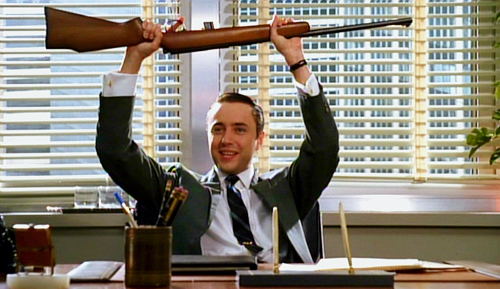IT TOOK ME A WHILE to like Pete Campbell. Campbell, as anonymous as a soup can, was also Sterling Cooper’s boyish friendly ghost, an alabaster wimp, regularly cuckolded by the agency. His ambition was shrill, his gestures desperate and hard to respect. He was an unsympathetic Pinocchio, striving even to be a real boy in a real man’s world. Today, I regard Pete Campbell — so subtly, selflessly and brilliantly played by Vincent Kartheiser — as the product of genius. Campbell embodies compelling anxieties. I want to describe two related episodes, linked by the disembodied John F. Kennedy, that transformed Pete Campbell into an all-American anti-hero.
Season 1, Episode 7: ‘Red In The Face’ features Pete’s attempt to return an unwanted wedding gift — a Chip ‘n’ Dip — to the department store. After an emasculating wait in line, in which women compare him unfavorably to their husbands, after his surname is trumped by his wife’s maiden name on the gift registry list (Campbell doesn’t exist) Pete encounters Kicks Matherton, an Ivy League prick who demeans him further. Embittered, failing to flirt with the cashier, declaring that Matherton has the clap, Pete swaps the Chip ‘n’ Dip for something more phallic: a .22 caliber bolt-action rifle. Back at the offices of Sterling Cooper, Pete shoulders the rifle and takes aim at the oblivious secretaries in the typing pool, his fantasy deer park, letting his gun sight linger over Peggy Olsen. Taking aim, contemplating her as a trophy, avenging a thousand petty humiliations, Pete’s face is a rictus of psychopathy. At last, one of the secretaries pushes his rifle-erection down again, as if it meant nothing.
Meanwhile, we’re approaching the election and Sterling Cooper is going for Nixon. Pete, who always leans left, aligns himself with Kennedy, whom he likens to Elvis. Referring overtly to Kennedy, and covertly to Pete, the Republican-controlled ad agency doesn’t want “a greasy kid with his finger on the button.” In the following episode ‘Nixon vs. Kennedy’, Pete says to Don Draper: “I don’t feel you’ve taken me seriously as a candidate.” When Pete tries to blackmail Draper about his double-identity (this is also the double loss of the father for Pete) the final image before they enter Bert Cooper’s office is that of Kennedy, on a muted television, directly behind Pete, mouthing. The apogee of ‘Red In The Face’ is Pete’s confessional deer hunter fantasy, as related to Peggy Olsen, on his office couch, with the rifle in shot; his masculine dream of killing and bearing the animal back to an imaginary log cabin. He would, he tells her, remove the loin and bring it to the woman who would be waiting for him, who would cook the deer in a cast iron skillet, “And I would wipe my knife on my knee and I would eat it while she watches.” The presentation of his vision, and its surreal obscenity, marks the moment when Pete loses Peggy, and his unborn son, that she carries without his knowledge. The child was conceived on this same couch.
Season 2, Episode 13: ‘Meditations in an Emergency’ is set during the last week of October 1962, and the Cuban Missile Crisis. The United States is at DEFCON 2. The first image is tight shot of a folksy tapestry of a deer and her fawn. Betty Draper studies it at her doctor’s office, contemplating an abortion. In her affectless manner, she seems puzzled. Beyond the kitschy symbolism, perhaps we recall Pete’s fantasy, and that he was educated at Deerfield… This final episode of the second season is about the loss of personal and corporate agency, or Agency, as Sterling Cooper merges with Putnam, Powell & Lowe. Beneath the parallel missile threat, the protagonists understand themselves as — to borrow from Norman Mailer, again — ciphers in a “vast statistical operation.” Don has lost his agency, and the agency in absentia. He has been negotiating his identities in California. Betty discovers that she is not free to determine the outcome of her pregnancy and tries to refute her loss of agency with a gimlet, a stranger, and stolen sex in the restroom of a bar. By the end of the episode, Don and Betty’s nuclear family is, temporarily, restored. As Don enters the living room, the western on television says, “reload” and “circle the wagons.” They sit before the campfire television, cloaking their atomic anxieties in myths.
With Kennedy a spectral presence, again, the finest scene takes place on Pete’s couch, with Peggy, and with the rifle present in every shot. Pete confesses his love for Peggy, and Peggy confesses that she has given away Pete’s son. His deer hunter dream dies here. His past and his future are obliterated. Peggy has removed Pete’s agency by surrendering his child to an adoption agency. She tells Pete that she could have possessed him, shamed him into being with her. Later, Peggy surrenders her agency to Catholicism, crossing herself as she waits for the bomb. That Draper — the suburban cipher, imposter — should go quietly toward the television is no shock; nor that Peggy lapses back into Catholicism under her bedclothes. It is only Campbell who strikes an attitude of defiance. Given the choice, he just says no to family values — he has Kennedy, after all — deciding against preparing for death with his wife and in-laws. He endures the night alone at Sterling Cooper, sitting, facing the window of his darkened office, his rifle projecting up from his groin. Campbell, alone, grasps his agency, in all its tortured ambivalence. One brief, elegant shot… Is he defending his territory at Sterling Cooper against the invasion of Putnam, Powell & Lowe? Is he thinking of the false news reports of Russian invasion with his Iwo Jima hard-on (that iconography produced by nationalist advertising)? Or is he waiting for the moment to take his own life — over Peggy, the Missile Crisis — to possess fully in death what he possesses so merely in life? Yet, more than this: Pete is the flash-forward, from Kennedy and Cuba, to Oswald at the window of the Texas School Book Depository. Pete Campbell is of the lineage of the patsy. Disillusioned, he is lost between mouse and man. Despite his fantasies of shooting the secretaries, perhaps suicide, Pete would be no better with a rifle than he is with a stick shift. The assured and simplified codes of masculinity that serve Draper do not so readily serve Campbell. They fail him when he tries to conform. Pete’s triumphs are momentary, like our own. His valuable account with Clearasil is won and lost through nepotism, and the vengeance of his double-father, Draper. Pete, like Peggy, bears key witness to the collapsing myth of meritocracy. Lastly, in his recourse to the rifle as a means of individuation, his sense of his impotence, insinuations and allusions to conspiracy, Pete Campbell is quintessentially American. He is the mean aggregation of the frustrated dolor that is the majority experience, the now still, now lunging psychopathy of American capitalism.





I agree with your point of view, your article has given me a lot of help and benefited me a lot. Thanks. Hope you continue to write such excellent articles.